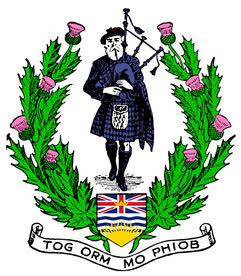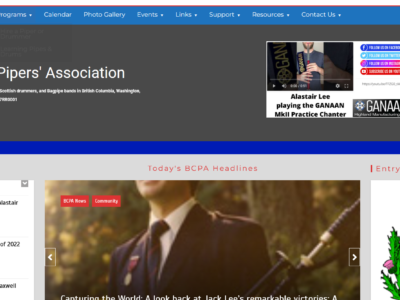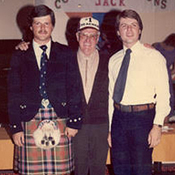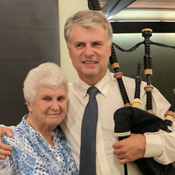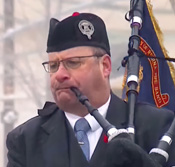Another wet and stormy night set the stage for appreciation of the warm hospitality of Ron and Eileen Sutherland on the evening of Friday, October 16th, 2009. Club members gathered with an expectation of a fine evening of the ‘great music’ and were blessed with some outstanding renditions.
Jack Lee led off the evening with a magnificent presentation of The Earl of Ross’s March. The tune is a powerfully expressed statement about the demise of a great Gaelic family. Jack paid full honour to that statement. See notes about the tune below.
Annie He followed with The Little Spree. This young lady is making great strides in her piping.
Bob McIlwaine played Too Long in this Condition. This tune is of MacCrimmon origin. But which MacCrimmon? Some think Padruig Mor, others Padruig Og. Both suffered personal indignities, Padruig Mor at the Battle of Worcester in 1651 and Padruig Og at the Battle of Sherriffmuir in 1719. However, there is a Gaelic rhyme that seems to fit the tune to Donald Mor while in MacKay country hiding out from MacKenzie, circa 1605-1620. His act of revenge for the murder of his brother, Squinting Patrick, took several lives in Kintail and forced Donald to leave Skye for about 15 years. He is said to have been seated outside the door of a MacKay home feeling sorry for himself. These words of a Gaelic rhyme tell the story:
S fada mar so, ‘s fada mar so,
‘S fada mar so tha mi ;
‘S fada mar so, gun bhiadh gun deoch,
Air banais Mhic Aoidh tha mi.
Too long like this, too long like this
Too long like this am I
Too long like this without bite or sup
At the wedding of MacKay.
Ed McIlwaine stepped up to play Lament for the Union – a cry of derision and sorrow? Not a tune that James VI would have cheered. As an aside, James VI commented on Highlanders as follows: As for the Highlanders, I comprehend them all in two sorts of people: the one that dwelleth in our mainland that are barbarous, and yet mixed with some show of civility; the other that dwelleth in the Isles and are all utterly barbarous.
Jack Lee then closed the meeting with the ground of The Bells of Perth and the ground and variations of MacLeod of Raasay’s Salute.
In the fullness of time their will be another meeting – the pre-Christmas meeting. Hopefully we will have a gaggle of young pipers demonstrating their skills. More on this later.
Below are some notes about the tune. The Earl of Ross’s March
Iain MacDonald, XIth Earl of Ross, and Lord of the Isles, surrendered the earldom of Ross on 10th July 1476; the earldom was thenceforward inalienably annexed to the Crown. In 1493 MacDonald’s other title, Lord of the Isles, was assumed by the King and lingers yet in honours attached to the present Prince of Wales. However, the dream of a quasi-independent Lordship of the Isles lingered in the Western Isles for many generations. One source (Poulter and Fisher, 1936) attributes the tune to Donald Mor MacCrimmon who lived in the period 1570-1640. However, it is not beyond the realm of possibility that the composer was an earlier MacCrimmon. The hero who is celebrated forfeited the earldom 94 years before Donald was born. A thought that comes to mind is whether this is one of the ancient tunes that may have grown over a period of time. It is not beyond credibility that one of Donald’s progenitors may have composed the original ground that subsequent generations expanded until Donald put the final touches to the piobaireachd we now know as the Earl of Ross’s March. Or, the inspiration for the piobaireachd could have been a bard’s tale told in poems and songs inspired by the demise of the Lordship, of which there must have been many as known Gaelic cultural practices of the time would indicate.
Speculation about the unknown and unknowable can lead to wild surmises about things that never happened, but, the mind does have a tendency to wander down uncharted lanes of thought.
From Andrew Wright, 13-09-05:
“The Earl of Ross’s March is also known as Kieundize – a corruption of the Gaelic Ceann na Deise or heads of corn. I think this is how it was titled in the Gesto book or the Gesto manuscript which was lost.
It is named as such in the music of Simon Fraser. If Fraser was correct, it could be a harvest tune perhaps something akin to Grain in Hides and Corn in Sacks, although there is no relationships in the melody or the structure of the tunes.
Perhaps it was an old tune renamed. There are many tunes with two names – occasionally they contradict each other – a tune may be called a Salute by one and a Lament by another”.
